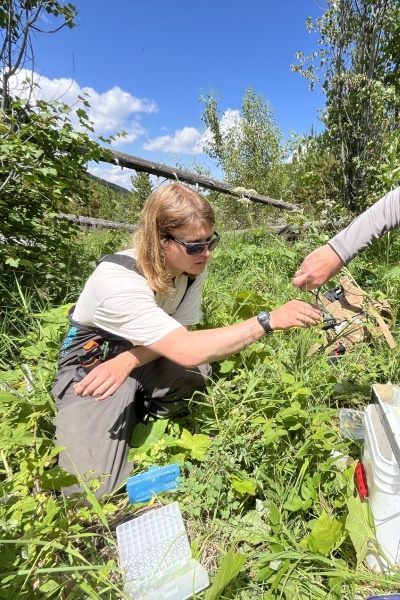October 16, 2025
Passionate about biology and the outdoors, biology major Bowen Charlebois ’26 spent part of this past summer interning with Montana Fish, Wildlife & Parks under the mentorship of Mike Duncan ’02.
 Bowen’s passion for the environment began at a young age. He spent countless hours outdoors, beach fishing in Maine and working as a summer sea guide, teaching children about stewardship and the importance of caring for the world around us. These hands-on experiences nurtured his love for biology and the natural world, as well as his desire to protect it for future generations. This past summer, he further cultivated that passion through an internship with Montana Fish, Wildlife & Parks, where he worked under the mentorship of Fisheries Manager Mike Duncan ’02, integrating his academic studies with his lifelong commitment to the environment.
Bowen’s passion for the environment began at a young age. He spent countless hours outdoors, beach fishing in Maine and working as a summer sea guide, teaching children about stewardship and the importance of caring for the world around us. These hands-on experiences nurtured his love for biology and the natural world, as well as his desire to protect it for future generations. This past summer, he further cultivated that passion through an internship with Montana Fish, Wildlife & Parks, where he worked under the mentorship of Fisheries Manager Mike Duncan ’02, integrating his academic studies with his lifelong commitment to the environment.
“Spending time in the great outdoors has become a cornerstone of my life,” Bowen says. “I want to protect these natural places so other people can have the same transformative experiences in the future. I believe it is very important if you're studying the sciences to take full advantage of the research opportunities that are available to you.”
In the spring of 2025, Bowen connected with McGavacks Professor of Biology and Director of Undergraduate Research Michael Wolyniak about potential summer research opportunities. Recognizing Bowen’s strong interest in ecological sciences and fisheries, Dr. Wolyniak introduced him to Dr. Duncan. Following several Zoom meetings, Bowen and Duncan discussed a variety of potential hands-on opportunities for the summer, during which Bowen would work alongside fisheries technicians and wildlife biologists on a range of field activities. In addition, Bowen worked with Dr. Wolyniak and Professor of Psychology Jennifer Vitale to secure funding that would cover transportation, food, and other necessities.
“The financial support from the College was invaluable, as it allowed me to travel to different job sites and access to opportunities I wouldn’t have had otherwise,” Bowen says.
Arriving in Bozeman, Montana, in mid-July, Bowen began his first day with a 12-mile hike, which allowed him to adjust to the elevation change before diving into the physically strenuous demands of his research work.
“The amount of work that went into getting to our job site was crazy. We did an incredible amount of bushwhacking just to reach some of the sites,” Bowen laughs. “It was amazing to see what a full day’s work really involved. This wasn’t a typical nine-to-five job—we worked until the day’s tasks were done.”
During his first week, Bowen learned the procedures, recognized the importance of building relationships with private landowners for lake and stream access, and familiarized himself with the team’s schedule. Working primarily with two members of Duncan’s team—Keith, a wildlife biologist, and Matt, a fisheries technician—he gained hands-on experience that prepared him for fieldwork in the weeks ahead. In his second week, Bowen ventured into the mountains to study streams feeding the valleys, searching for the endangered westslope cutthroat trout, a native species threatened by rainbow trout. Through sampling and genetic testing, he helped assess fish population health and protect ecosystem integrity, providing data to guide regional management and angling decisions. His third week took him more than two hours beyond Bozeman to a mountain campground, where he joined a large collaborative effort among state, federal, and volunteer organizations to survey tributaries across the range—an experience that deepened his field expertise and forged connections for future conservation work statewide.
“There’s a lot of reciprocity between different types of organizations,” Bowen says. “It was really interesting to see how they collaborate, divide tasks, and make everything happen together.”
As his time in Montana came to a close, Bowen reflected on his own experience with Duncan and learned about Duncan's journey since graduating from Hampden-Sydney and how he reached his current position. During this time, Bowen’s mother also flew out to see his work firsthand and spend time with him in the beautiful state.
“This research experience was incredibly impactful and memorable,” Bowen says. “Fishing in Montana is legendary with people coming from all over the world to experience it. Montanans are passionate about their traditions and local culture. Ultimately, it comes back to loving the environment and caring for the world around us, so we can preserve it and share these amazing experiences for years to come.”
Amid Montana’s awe-inspiring landscapes, Bowen exemplifies a good man, good citizen, and a thoughtful and dedicated steward of the natural world, approaching it as something to care for rather than to possess. His curiosity, strong work ethic, and passion for the outdoors drive him to contribute meaningfully—advancing knowledge, building relationships, and embracing opportunities both on and off the Hill. With this mindset, he is poised to leave a lasting mark on the world, shaping a future where people and nature thrive together.


